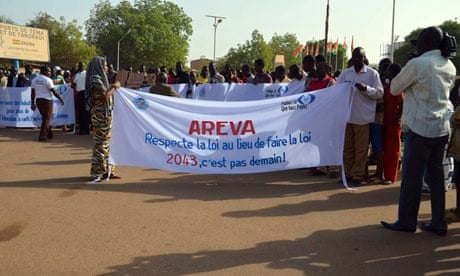The protracted negotiations on uranium mining between Niger and Areva, the French energy multinational, are not just a trial of strength between an African government and a big company. The face-off will also test whether there is more than just pious sentiment to the notion that African countries should derive greater benefit from their natural resources.
Areva, which owns stakes in the Somair and Cominak mines, has been negotiating with Niger over new uranium mining contracts for two years. The mines' 10-year licences expired on 31 December without a new agreement, although Niger issued a decree on 27 December providing a legal framework under the 2006 mining law for operations to continue.
The company is tight-lipped on discussions. Olivier Wantz, a senior executive vice-president of Areva, was in the capital Niamey this week for three days of talks.
"Talks between the Niger government and Areva over mining accords are continuing, and we do not want to make any further comments on these ongoing negotiations," an Areva spokesman said.
The mines have been closed since mid-December for what Areva describes as routine maintenance. Some see the move as hardball tactics by the company to put pressure on the Nigerien government.
At heart of the matter is the country's desire for a better deal. Niger accounts for more than a third of Areva's uranium production, and President Mahamadou Issoufou's government wants to increase the royalties the company pays from 5.5% of revenues to 12%, officials told Reuters.
Areva, which is 87% owned by the French government, says an increase in the royalties rate would make operations unprofitable. The company has been mining uranium in Niger, a former French colony, for four decades. It owns about two-thirds of the open-cast Somair mine, which produced an estimated 3,000 tonnes of uranium ore last year, and approximately one-third of the smaller, underground Cominak mine.
France gets 75% of its electricity from nuclear energy but has never said to what extent it relies on Niger for uranium to fuel its 58 nuclear reactors. Niger and NGOs say one in three light bulbs in France is powered by Nigerien uranium. A French parliamentary committee report in 2008 put the figure at about one in five.
Niger is desperately poor, ranking last of the 187 countries in the 2012 UN Human Development Index. Three-quarters of its people live on less than $2 a day and malnutrition is rife, with the country beset by droughts. Although mining made up 70.8% of Niger's exports in 2010, it contributed only 5.8% of the country's gross domestic product.
According to a report from Oxfam France and the Niger arm of Publish What You Pay, the transparency group, Areva's two mines produced uranium worth more than €3.5bn (£2.9bn) in 2010, but Niger received just €459m, or 13% of this amount. In 2012 Areva received tax exemptions worth €320m, the report says.
Areva rejects Oxfam's figures and insists that since the creation of the mining companies, 40 years ago, 80% of revenues – €871m – have gone to Niger and 20% to Areva and its partners. It says Cominak and Somair have always worked within the framework of a mining agreement with Niger and observed mining laws. Areva made a loss of €99m last year, but expects to make an operating profit of more than €1.1bn this year, helped in part by its uranium mining business.
The negotiations put the French government in a tough spot. As majority owner in Areva, it has to look out for French commercial interests. On the other hand, Pascal Canfin, the energetic French development minister, is a champion of domestic resource mobilisation in poor countries – governments generating their own revenues – and a backer of EU initiatives on transparency in the extractives sector. NGOs are watching closely to see how different French interests play out.
"As France has a strong stand on transparency and domestic resource mobilisation, it would make sense for it to put pressure on Areva. But it is not happening, it is a massive embarrassment for the French government," one activist said.

Comments (…)
Sign in or create your Guardian account to join the discussion